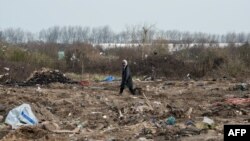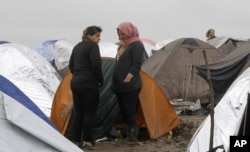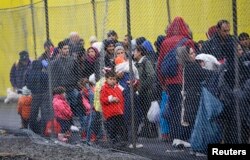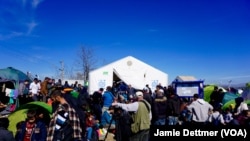French police have arrested 14 people protesting the presence of a migrant camp in Calais after they blocked bridges and set fire to tires, calling for foreigners to go home.
The protesters calling themselves Generation Identitaire — or "Identity Generation" — gathered early Saturday, carrying banners saying "Go Home" and "No Way." A press release from the group said they took over bridges "that allowed migrants to access the city of Calais."
Calais has become a bottleneck for migrants hoping to cross the English Channel to Britain. Thousands of people have gathered in a refugee camp known as "the Jungle" for its abysmal living conditions. Several other, smaller camps also exist along the northern French coast.
On Friday, security forces in Calais detained five men dressed as police officers who were suspected of attacking migrants.
Macedonia's grudge
Also Friday, Macedonia's president said his country has been forced to pay for the actions of the European Union in the current migrant crisis, costing the nation $28 million so far.
In an interview published Friday in the German newspaper Bild, Gjorge Ivanov said Macedonia is fed up with the situation after having to declare a national crisis.
He complained that the European Union has not contributed "a cent" to Macedonia's expenses and said the trade bloc has "completely lost sight" of security concerns as it struggles to accommodate millions of Syrians, Afghans and Iraqis fleeing violence and economic insecurity at home.
Ivanov said his country had confiscated some 9,000 forged or stolen passports from the migrants and complained that Germany has declined to share information on biometric information technology or militant Islamists.
Borders closing
Thursday, Austria endorsed the decision by Macedonia and three other Balkan countries to close their borders to almost all migrants. Vienna called for the migrants' path to remain closed indefinitely.
Austrian Interior Minister Johanna Mikl-Leitner said her government supports the action to restrict immigrants trying to cross the Balkans to northern Europe. This week's action by Macedonia, Slovenia, Serbia and Croatia applies to all migrants except those planning to seek asylum in those four countries.
In another development, Turkish news agencies said five migrants, including a three-month-old infant, have drowned off Turkey's western coast after a boat taking them to Greece sank on the way to the island of Lesbos. Nine people were reported rescued from the boat, which was carrying Afghan and Iranian migrants. Two are still missing.
EU, Turkey working on plan
In the face of U.N. opposition, the European Union and Turkey are working to finalize a plan to return to Turkey all migrants arriving in Greece from there.
U.N. human rights chief Zeid Ra'ad al-Hussein said such a plan would be illegal. "I urge the EU to adopt a much more rights-compliant and humane set of measures on migration" at a summit scheduled to begin March 17, Al Hussein told the U.N. Human Rights Council in Geneva Thursday.
"International guarantees protecting human rights may not be side-stepped or diluted," he added. "Any returns of people must be in conformity with international human-rights standards. Arbitrary and prolonged detention must be avoided."
After months of disagreements among the 28 EU nations, EU leaders said this past week they will give Turkey more than $3 billion to help with the costs of hosting nearly three million Syrian refugees. In exchange for Turkey's help in stemming migration flows to Europe, the deal would include easing European visa requirements for Turks and a promise to speed up talks about Ankara's application to join the Union.
The situation near the Greek-Macedonian border has been described as dire. Authorities said nearly 36,000 migrants and refugees were stranded in a muddy, unhygienic camp near the Idomeni border crossing into Macedonia. Others are stuck in Macedonia near the Serbian border, in a "no-man's-land" between the two countries' frontiers.








